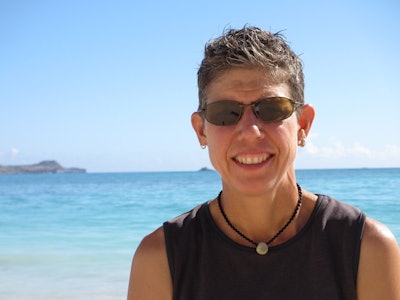People are still saying “the virus doesn’t discriminate,” in spite of all the evidence to the contrary. We are not equally “all in this together.” The virus is hitting vulnerable populations the hardest—our elderly, those with underlying health conditions, unhoused people, Natives, Black and Brown communities, and especially those living at any of these intersections. They are the people whose lives are even more at risk as states open up. The White supremacist masculinity on display in the “Reopen America” rallies is not lost on them.
They are the same folks disproportionately trapped in prisons, jails and detention centers. Those locked in Tacoma’s Northwest Detention Center in Washington state undertook three hunger strikes in three weeks. In case we didn’t get the message, they spelled out “SOS” with their bodies in the yard. And while COVID-19 ravages these communities, some leaders have continued to insist on calling it the “Chinese virus,” leading to attacks on Asian people across the country.
Some in Big Ag are seizing the opportunity try to cut farm workers’ pay to even less than it is now. In some places, this could mean wages as low as $4 per hour. These workers have been identified as “essential” by officials because they feed us, but that label means nothing but worsening conditions of exploitation, especially for those who are undocumented.
Decades of disinvestment in low-income Black and Brown urban communities inure us to the inhumanity of turning off their water in a pandemic. Centuries of colonial policies on Native reservations have led to inadequate housing and water. The COVID-19 outbreak on the Navajo Nation, where washing your hands is a luxury, is the result of “normal” structural violence. It gives new resonance to the Standing Rock cry: Water is Life.
 Dr. Judy Rohrer
Dr. Judy RohrerHospitals pushed to the brink devised plans for “rationing care,” causing many of our disabled friends to ask about the metrics used to determine whose lives matter. And then there’s the lack of PPE for nurses and home healthcare workers, the vast majority of whom are women. Those with the highest-risk, lowest paid jobs are mostly women of color and immigrants. We’ve seen the photos of nurses resorting to wearing garbage bags for protection. That says it all—suddenly “essential,” always already disposable. COVID-19 is exposing the inequities and injustices in what we used to call “normal” life.
Some in Congress are calling for better collection and release of all COVID-19 data regarding race, ethnicity, sex, age, socioeconomic status and other demographics. We should support them in that effort. We need that data now (really yesterday) so that we can plan effective responses and mitigation strategies—ones that rise to the challenge, rather than settle for the cliché “the virus doesn’t discriminate.” The “public” in public health rests on a simple notion: None of us is safe until all of us are safe.
Beyond safety and survival, we need that data to inform the way we reconstruct society post-COVID-19. I for one don’t want to go back to “normal.” The skies are clearer and so too our recognition that our way of life was unjust and unsustainable. We don’t simply need to “get through this.” We need repair, care, regeneration, and real transformation.
We are already creating that new, better world. Many of us are meeting neighbors for the first time, checking in on older relatives and friends, making masks, participating in mutual aid collectives. Scholar-activists are forging international alliances, standing in solidarity with indigenous peoples, coordinating support for refugees and migrants, calling for climate strikes, rent strikes, and debt strikes. This is happening globally. Higher Ed should be paying attention to what the virus is exposing and what it is catalyzing.
I am a proud member of the diversity programs at Eastern Washington University (EWU). For 40-50 years American Indian, Africana, Chicanx, and Women’s and Gender Studies (soon to be Gender, Women’s & Sexuality Studies) have served our respective communities and all their intersections. These four independent programs have been resisting a top-down insistence on consolidation for almost two years. With the escalating budget crisis due to COVID-19, I worry that our programs and others like ours are seen as easy targets for defunding or elimination by neoliberal administrators.
Interdisciplinary “diversity” programs (ethnic, indigenous/Native, gender, sexuality, disability, border/migration studies, etc.) are catalysts for knowledge production, community engagement, cultural vitality, and activism. Our communities hold us accountable and remind us that our work should primarily be by and for them. At our best we collect, analyze, and interpret data and lived experience from our communities and use it toward the creation of a more just society.
We knew from the start that the virus was going to discriminate because we live and study the vulnerabilities it is exploiting—structural racism, sexism, classism, colonialism, ableism, and xenophobia. It would be bitterly ironic if a panicked response to the pandemic’s financial fallout was a divestment from the very programs we need right now. We hope instead that this crisis increases Higher Ed’s commitment to, and resources for, imagining and building our way out of this catastrophe and beyond the violences of “the normal.”
Dr. Judy Rohrer is the director of the Women’s and Gender Studies Program at Eastern Washington University.


















